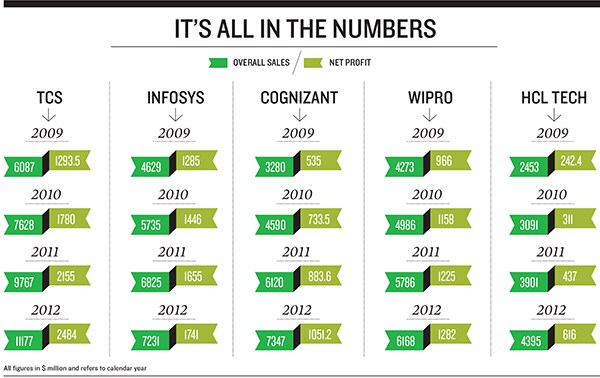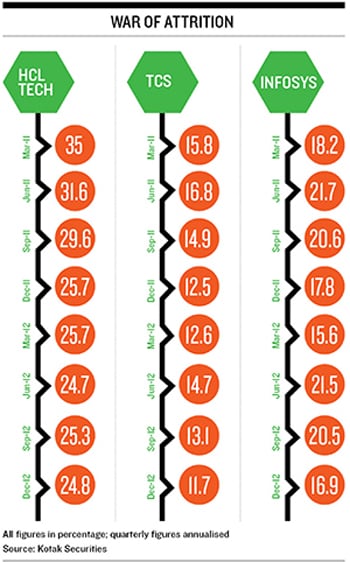HCL Tech's Problems With New Recruits
HCL Technologies bucked the slump with its upbeat financial performance. Then why has it been reluctant about onboarding freshers?


S Anand Kumar is an angry young man. In November 2011, the 23-year-old was offered a job by HCL Technologies during campus placements, even before he earned his engineering degree. That was then. Over a year later, he is still in the dark about his joining date. The endless wait is frustrating for Anand Kumar as well as several others who passed out of engineering colleges across the country in 2012. (Around 5,000 offers were made, a number that HCL wouldn’t confirm or deny.)
Over the last few weeks, their frustration found vent on Facebook and eventually erupted as protests, both online and in evocative locations. Recently, in Bangalore, around 50 of them went on a hunger strike at Freedom Park, the same venue where hundreds gathered to show support for Anna Hazare in 2011.
Interestingly, HCL Technology is not the only company that’s struggling to bring new recruits on board. Even Infosys has staggered onboarding by several months. “Since the 2008 meltdown, the business cycles around the world have been volatile and IT companies are still unable to get a clear visibility into the future trend,” says E Balaji, CEO of Randstad India. Yet, only HCL seems to have provoked this response. It’s all the more surprising if one takes a look at the company’s performance.While almost every player in the country was giving a cautious outlook, HCL Tech not only sounded positive, it also followed up with its performance. Compared to 2009, its revenues have risen by close to 80 percent (bettered only by TCS and Cognizant, among the top five) and its net profit has more than doubled (net profit margins for the calendar year rose by 4 percentage points). On the stock market, its share price has grown faster than its peers (by a big margin, in the last one year, and a smaller margin in the last four). Bhavin Shah, CEO of Equirus, says its financial performance in the last few quarters had allayed the concerns investors had about the company even a year ago.
There are two more reasons why the reluctance to onboard employees surprised many. Top IT companies have gone slow on hiring because for every three employees who were deployed in a project, they had one who wasn’t. For HCL, this ratio is 4:1, considered to be optimal. In the last few years, it has been propounding an ‘employees first’ philosophy that purportedly places employees even ahead of customers. Surely, it could treat its new hires with more respect?
Its reluctance to onboard freshers—when its numbers seem healthy, and when its management philosophy seems clear-cut—has raised questions about both the assumptions. How do they all add up? For answers, we need to look at its performance in a more granular fashion.
First, its financial performance. Despite the hype around the big wins, HCL’s real achievement in the last couple of years has not been so much about revenue growth as it is about the margins. In 2012, despite its smaller size, it grew slower than both TCS and Cognizant. Besides, its growth rate also dropped from 26 percent during both 2010 and 2011 to 12 percent in 2012. But, more importantly, even this growth came predominantly from remote infrastructure management projects. Last quarter, this segment saw a year-on-year growth of 37 percent. (In contrast its other three big service lines—enterprise applications, engineering and R&D, custom applications—grew at 5 percent.) Over the last two years, nearly half its growth came from infrastructure services. From 15 percent of its total business in 2009, infrastructure management now accounts for close to 30 percent. 
So, jobs are likely to be generated in infrastructure, rather than in software services. (Campus hires were made by individual service lines and software services, which looked promising in 2011, ended up otherwise.)
Krishnan Chatterjee, vice president and head, strategic marketing, HCL, says the company has opened infrastructure management positions for campus hires, and over 1,200 have applied. (It has a good momentum. The current CEO, Anant Gupta, started his career there, he says.)
However, for campus hires, that would mean taking a cut in the salary. (While starting salary for software services is Rs 3.25 lakh a year, it’s Rs 2.75 lakh a year for infrastructure. But, even this doesn’t mean you join the company straight away. You only get the date of joining, says Anand. “Further, they told us we cannot shift from infrastructure to software.”)
Why doesn’t the company avoid all the bad press—and the bad blood—by taking them on board? (In the worst case scenario, a campus hire waits till the end of the calendar year in which he graduated.) A few years ago, questions would have been raised about the company’s cash flow. But today, it’s mostly seen as the management’s desire not to dent the margins. “It’s about financial discipline,” says Shah of Equiris. Chatterjee insists it’s not about margins, but it’s about the concern for the campus hires. “Would you rather we hire them and place them on bench? Now they have an option to look for other jobs,” he says.
The big concern about HCL Tech is that a good part of even those inside might be doing that. For a company that goes by the tag line ‘employees first’, its attrition rates are high. It’s not immediately evident from the numbers the company gives out every quarter. According to HCL Tech’, its attrition rates for the December quarter is 13 percent, which is much better than even TCS and Infosys. But, the devil is in the way the numbers are calculated. If one applies a common formula, in the last four quarters, HCL’s annualised attrition rate has been around 24-25 percent, (compared to TCS’ 13 percent, Infosys’ & Wipro’s around 17 percent—see table on pg 30). Chatterjee says it’s not a bad thing. HCL Tech has been a hunting ground for other companies because of the training it gives to its employees, he says.
This, and the company’s reluctance to bring the campus hires on board, has highlighted a point that’s often missed amidst its employees-first slogan. It’s not so much about employee satisfaction as it is about enabling them to bring in more revenues. (HCL’s revenue per employee has grown in the last three years, while it came down for its peers.) Chatterjee says the philosophy came out of the recognition that value is created in the zone where an employee engages with the customer. The idea behind employees-first management is to enable him to create that value. “If there is no customer, there is no value,” he said.
It’s when the tide turns, that we get a truer view of management ideas.
First Published: Apr 19, 2013, 06:15
Subscribe Now